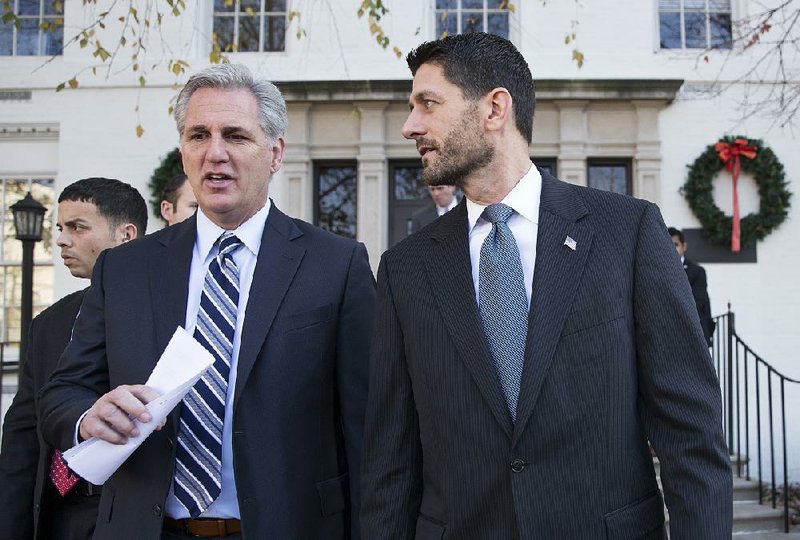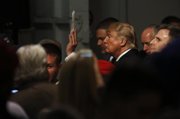WASHINGTON -- The House voted overwhelmingly Tuesday to tighten controls on travel to the U.S. and require visas for anyone who's been in Iraq or Syria in the previous five years.
The legislation takes aim at the visa-waiver program that allows citizens of 38 countries to travel to the U.S. for stays of 90 days and fewer without obtaining visas from an embassy or consulate. Belgium and France, home to most of the perpetrators of last month's Paris attacks, are among the participating countries.
Also Tuesday, Republican presidential candidate Donald Trump's call to block Muslims from entering the United States was being met with near-universal condemnation -- from former Vice President Dick Cheney to British Prime Minister David Cameron, and many others around the globe.
The visa-waiver bill, which passed 407-19, would institute a series of changes, including the new visa requirement for citizens of Iraq, Syria and any other country deemed a terrorist hot spot, along with anyone who's traveled to those countries in the previous five years. Exceptions are made for official government visits and military service.
Arkansas' U.S. Reps. Rick Crawford, French Hill, Bruce Westerman and Steve Womack, all Republicans, voted in favor of the bill.
"We simply cannot give people from other countries special access to our country if we don't have all the information we need to ensure they are not a threat to our national security," said bill sponsor Candice Miller, R-Mich. "Obviously the world is a very different place" than when the visa-waiver program was created.
Countries in the visa-waiver program also would be required to share counterterror information with the U.S. or face expulsion from the program. All travelers would be checked against Interpol databases, and visa-waiver countries would be required to issue "e-passports" with biometric information. The bill would require countries to be able to confirm that such documents are legitimate when they are scanned.
"You have more than 5,000 individuals that have Western passports in this program that have gone to Iraq or Syria in the last five years," Majority Leader Kevin McCarthy said. "Those are gaps that we need to fix."
About 20 million visitors come to the U.S. annually under the visa-waiver program. They already are screened through an online system maintained by the Department of Homeland Security, and the White House recently has announced a series of improvements to that and other aspects of the program.
But in past years, the program has been used by would-be terrorists, including "shoe bomber" Richard Reid, who boarded a flight from Paris to Miami in December 2001 without a visa and attempted to set off a bomb. Zacarias Moussaoui, the "20th hijacker" from 9/11, also flew from London to Chicago with a French passport and no visa in February 2001, according to a Homeland Security inspector general report from 2004.
Rep. Adam Schiff of California, the top Democrat on the House Intelligence Committee, has said the measure was crafted by House and Senate negotiators with input from members of President Barack Obama's administration. All 19 votes against the bill Tuesday came from Democrats.
There is a different version in the Senate by Democrat Dianne Feinstein of California and Republican Jeff Flake of Arizona. The travel industry, which backs the House bill as a balanced approach, says the Senate bill goes too far in adding new biometric requirements for all visa-waiver travelers, which might be difficult to enact.
Unlike the House bill, the Senate plan would require travelers under the visa-waiver program to provide biometric information before traveling to the U.S. and force airlines to provide information on visa-waiver passengers "as soon as practicable" before arriving at a port of entry, according to an analysis by Bloomberg Government legislative analyst Michael Smallberg. It would increase the fee charged to applicants using the Department of Homeland Security's electronic authorization system.
The Senate bill hasn't been scheduled for a floor vote. Sen. John Cornyn of Texas, the second-ranking Republican in the chamber, said Monday that he expected some changes to the visa-waiver program would be included in government-spending legislation being negotiated by lawmakers.
On the House proposal, Senate Intelligence Committee Chairman Richard Burr, R-N.C., has said he wants to hear from immigration agencies about the practicality of requiring participating foreign countries to include biometric information in their passports. Some countries may not be able to meet such a requirement, he said.
Congress should tread carefully when changing the visa-waiver program because of "the tourism dollars that ride on that," he said.
A handful of Democratic lawmakers spoke against the visa-waiver legislation before its passage. Rep. Keith Ellison, D-Minn., said the bill is overbroad in stripping visa-waiver privileges from all Syrians and Iraqis and said it should include more exceptions for more people, such as journalists and researchers.
"Our focus should be on terrorism, not just country or origin," Ellison said.
Separately, some lawmakers are talking about looking at the fiance visa program that allowed Tashfeen Malik -- the female shooter in the San Bernardino, Calif., attacks that resulted in 14 deaths last week -- into the country. The Homeland Security Department already has announced a review of that program.
Malik was one of just 519 Pakistanis allowed into the country last year specifically to marry U.S. citizens.
The Obama administration is reviewing the program, Homeland Security Secretary Jeh Johnson said Monday. He did not say what changes were being considered.
The K-1 visa program is among the smallest visa categories managed by the government. Of more than 9.9 million visas issued in fiscal 2014, just 35,925 -- roughly 0.3 percent -- were fiance visas, according to State Department figures.
Much of the focus is on rooting out marriage fraud. The two people must prove they have physically seen each other within the past two years, unless meeting in person would violate "strict and long-established customs" or cause an "extreme hardship."
"This visa has been totally under the radar," said Marc Rosenblum, deputy director of the U.S. Immigration Policy Program at the Migration Policy Center. "The issue of marriage fraud has definitely gotten a lot of attention, just not as a security vulnerability."
The vetting process is similar to but less stringent than the process used to approve refugees from Syria. It is far more extensive than checks made for traditional tourist visas, Rosenblum said.
Brickbats for Trump
Trump's statement Monday advocating a "total and complete shutdown of Muslims entering the United States" was blasted from several directions as bigoted, unconstitutional and potentially dangerous for American interests abroad.
The U.K.'s Cameron slammed it as "divisive, unhelpful and quite simply wrong." U.N. spokesman Farhan Haq said Secretary-General Ban Ki-moon denounced "any kind of rhetoric that relies on Islamophobia, xenophobia, any other appeal to hate any groups."
The Church of Jesus Christ of Latter-day Saints issued a statement in support of religious freedom.
Even Harry Potter author J.K. Rowling weighed in, decrying Trump on Twitter as worse than her fictional villain Lord Voldemort.
"This is not conservatism," Republican House Speaker Paul Ryan told reporters after a private GOP caucus meeting. "What was proposed yesterday is not what this party stands for, and more importantly it's not what this country stands for."
Trump didn't back down from his proposal Tuesday, saying that banning Muslims "until our country's representatives can figure out what the hell is going on" is warranted after last month's attacks by Muslim extremists in Paris and last week's shootings in California.
"Somebody in this country has to say what's right," Trump said in an interview with ABC taped Tuesday. "It's short-term. Let our country get its act together."
Trump's proposed ban would apply to immigrants and visitors alike, a prohibition affecting adherents of a religion practiced by more than 1 billion people worldwide. Trump clarified in a round of television interviews Tuesday that his proposed ban would not apply to American citizens traveling abroad and would allow exemptions for certain people, including the leaders of Middle Eastern countries and athletes for certain sporting events.
However, not specified in his list of exemptions, for example, are Pakistani activist Malala Yousafzai and the four civil-society groups that led Tunisia's transition to democracy -- all Muslim Nobel Peace Prize winners.
Sen. Lindsey Graham said Trump's rhetoric risked inflaming tensions in the Middle East, playing into the recruiting strategy of Islamic State militants, who have framed their battle as a war between Islam and the West.
"He's putting our soldiers and diplomats at risk; he's empowering the enemy," said Graham, another GOP presidential contender, in an interview with CNN. Trump, he said, is making new enemies of people "who came to our side in Iraq and Afghanistan and who are under siege in their own countries."
Former Florida Gov. Jeb Bush, another Trump rival, suggested Trump's comments were helping violent extremists gain strength.
"They want us to marginalize Muslims so that they move in their direction, rather than in ours," he said.
But Sen. Ted Cruz of Texas, another GOP presidential candidate, declined to criticize Trump.
"I commend Donald Trump for standing up and focusing America's attention on the need to secure our borders," he said at the Capitol.
At the White House, spokesman Josh Earnest lambasted Trump as a "carnival barker" and called on his rivals to denounce their fellow candidate.
"What he said is disqualifying," Earnest said. "Any Republican who's too fearful of the Republican base to admit it has no business serving as president, either."
Trump rejected the criticism and accused his opponents of trying to use the issue to boost their campaigns.
"I'm the worst thing that's ever happened to ISIS. The people in my party fully understand that," he said on ABC. "They get it. They're trying to get publicity for themselves."
Also Tuesday, Trump denied an Associated Press report that he planned to visit the majority-Muslim kingdom of Jordan at the end of December.
Trump tweeted Tuesday, "Despite my great respect for King Abdullah II, I will not be visiting Jordan at this time. This is in response to the false AP report."
Trump has said he plans to visit Israel. A U.S. official, speaking on condition of anonymity, had told the AP that the U.S. government was making preparations for Trump also to visit Jordan at the campaign's request. The official was not authorized to publicly discuss the preparations because of security concerns. Trump receives Secret Service protection.
Information for this article was contributed by Erica Werner, Jill Colvin, Bruce Smith and Alicia A. Caldwell of The Associated Press; by Kathleen Miller, Roxana Tiron and Justin Sink of Bloomberg News; and by Maggie Haberman of The New York Times.
A Section on 12/09/2015



